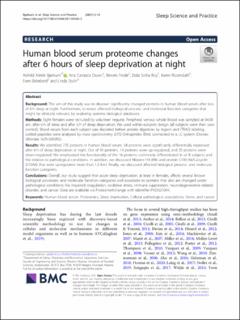| dc.contributor.author | Bjørkum, Alvhild Alette | |
| dc.contributor.author | Duran, Ana Carasco | |
| dc.contributor.author | Berven, Frode Steingrimsen | |
| dc.contributor.author | Roy, Dola Sinha | |
| dc.contributor.author | Rosendahl, Karen | |
| dc.contributor.author | Birkeland, Even | |
| dc.contributor.author | Stuhr, Linda Elin Birkhaug | |
| dc.date.accessioned | 2022-02-14T14:38:48Z | |
| dc.date.available | 2022-02-14T14:38:48Z | |
| dc.date.created | 2022-01-20T09:22:56Z | |
| dc.date.issued | 2021 | |
| dc.identifier.uri | https://hdl.handle.net/11250/2978896 | |
| dc.description.abstract | Background
The aim of this study was to discover significantly changed proteins in human blood serum after loss of 6 h sleep at night. Furthermore, to reveal affected biological process- and molecular function categories that might be clinically relevant, by exploring systems biological databases.
Methods
Eight females were recruited by volunteer request. Peripheral venous whole blood was sampled at 04:00 am, after 6 h of sleep and after 6 h of sleep deprivation. We used within-subjects design (all subjects were their own control). Blood serum from each subject was depleted before protein digestion by trypsin and iTRAQ labeling. Labled peptides were analyzed by mass spectrometry (LTQ OritrapVelos Elite) connected to a LC system (Dionex Ultimate NCR-3000RS).
Results
We identified 725 proteins in human blood serum. 34 proteins were significantly differentially expressed after 6 h of sleep deprivation at night. Out of 34 proteins, 14 proteins were up-regulated, and 20 proteins were down-regulated. We emphasized the functionality of the 16 proteins commonly differentiated in all 8 subjects and the relation to pathological conditions. In addition, we discussed Histone H4 (H4) and protein S100-A6/Calcyclin (S10A6) that were upregulated more than 1.5-fold. Finally, we discussed affected biological process- and molecular function categories.
Conclusions
Overall, our study suggest that acute sleep deprivation, at least in females, affects several known biological processes- and molecular function categories and associates to proteins that also are changed under pathological conditions like impaired coagulation, oxidative stress, immune suppression, neurodegenerative related disorder, and cancer. Data are available via ProteomeXchange with identifier PXD021004. | en_US |
| dc.language.iso | eng | en_US |
| dc.publisher | BMC | en_US |
| dc.rights | Navngivelse 4.0 Internasjonal | * |
| dc.rights.uri | http://creativecommons.org/licenses/by/4.0/deed.no | * |
| dc.title | Human blood serum proteome changes after 6 hours of sleep deprivation at night | en_US |
| dc.type | Journal article | en_US |
| dc.type | Peer reviewed | en_US |
| dc.description.version | publishedVersion | en_US |
| dc.rights.holder | Copyright The Author(s) 2021 | en_US |
| dc.source.articlenumber | 14 | en_US |
| cristin.ispublished | true | |
| cristin.fulltext | original | |
| cristin.qualitycode | 1 | |
| dc.identifier.doi | 10.1186/s41606-021-00066-2 | |
| dc.identifier.cristin | 1985664 | |
| dc.source.journal | Sleep Science and Practice (SSP) | en_US |
| dc.identifier.citation | Sleep Science and Practice. 2021, 5, 14. | en_US |
| dc.source.volume | 5 | en_US |

